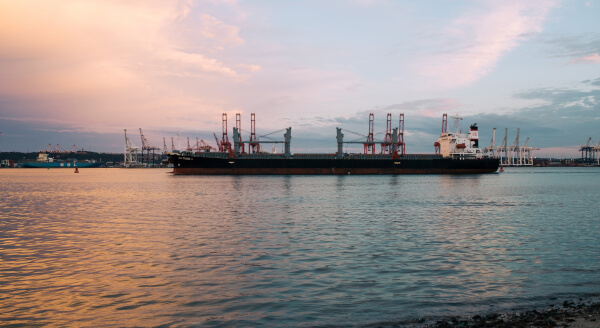Marine Cargo Insurance
Cargo insurance
Cargo insurance (also called marine cargo insurance) covers physical damage to, or loss of your goods whilst in transit by land, sea and air and offers considerable opportunities and cost advantages if managed correctly.
Unfortunately, many UK traders do not want to become involved in arranging this type of insurance because they feel they do not have sufficient knowledge. They see it as an unnecessary expense involving extra administration and make the mistake of allowing suppliers or customers to control this vital area of business. This loss of control not only increases the difficulties of implementing an effective trade risk management strategy but can also have far-reaching effects on profitability.

Fortunately, this attitude is changing, with more and more companies following the lead of many of the ‘blue-chip’ manufacturing and trading giants of the UK economy who tend to take full control of this type of insurance.
Cargo insurance is usually provided by the means of one of three Institute Cargo Clauses – A, B or C, plus War Clauses and Strikes Clauses. Simply put, Cargo Clauses A provides the most coverage with B and C giving less coverage which is reflected in reduced premiums for the lower cover (somewhat similar to car insurance coverage with comprehensive, third party, fire and theft, and third party policies). Also, there is an Institute Cargo Clauses (Air) for movement by air, which is equivalent to the A clauses. Your insurance company or broker will be able to give details of exactly what cover is given by each clause so you can choose the most appropriate for your business needs and trading patterns.
Exports
Many major UK exporters and trading companies sell on Cost Insurance and Freight (CIF) or similar terms, which allows them to arrange marine cargo insurance in the UK – usually on an ‘open cover’ basis. Because this insurance cost is legitimately passed on to the customer, who also gets the benefit of the insurance, this virtually amounts to free insurance which the exporter controls.
Many foreign buyers see this as an essential service provided by the exporter, given that cargo insurance rates in the UK are often cheaper than those available to the overseas customer in his local market. Indeed, exporters who do not provide a ”package” which includes insurance, can lose business to competitors who do.
The other side of the coin is where UK exporters allow their customers to arrange insurance. This can range from selling on Ex Works terms to exporting on Free on Board (FOB) or Cost and Freight (CFR) terms. An Ex Works sale represents the minimum obligation for the seller, who has merely to make the goods available at his premises for collection by the buyer”s designated carriers.
However, what tends to be overlooked is that the exporter is totally reliant on the buyer arranging adequate insurance on goods which have probably not been paid for. If the goods arrive damaged or
if the buyer’s insurance does not cover the loss, the exporter may not receive payment. Additionally, if the goods or shipping documents are rejected on arrival at the destination, the insurance risk can often revert to the exporter who may not have taken out any insurance.
Imports
Many importers assume that the suppliers are including the marine cargo insurance for free when, in fact, the cost is included in the purchase price. In addition, obtaining information from suppliers about these costs and whether they are being loaded can prove difficult.
Another important issue is the type of cover being provided – is it comprehensive ‘all risks’ or just ‘total loss’ only? Is it on a warehouse-to-warehouse basis or just warehouse to UK port? Without this information, importers may not realise they are paying too much for insurance which does not meet their needs and may leave them with uninsured exposure.
A further issue is who is actually insuring the goods. The security of some overseas insurers may not compare favourably with the security of insurers in the highly regulated UK market. In the event of goods arriving damaged in the UK, the importer will probably deal with the UK agent of the overseas insurance company – an agent who will be working for the insurer, not the importer. This can lead to delays in processing and settling claims.
If the importer takes control of cargo insurance they can arrange the necessary cover in the UK market, which is often more comprehensive and price competitive than in overseas markets.
